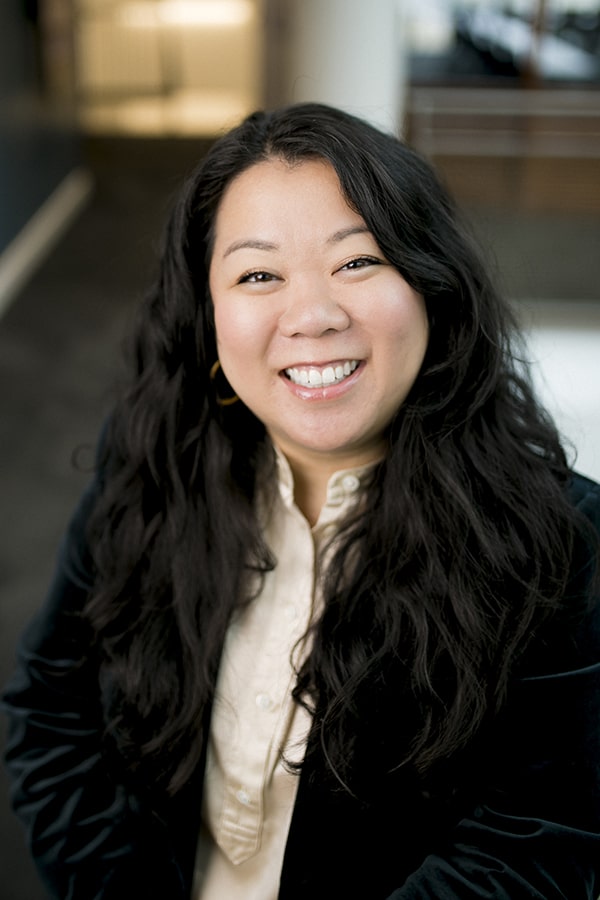Faculty Spotlight: Sarah Hae-In Idzik
By Stacy Kish
Sarah Hae-In Idzik, assistant professor of rhetoric in the Department of English, focuses her research on the intersection of rhetoric, Asian American/ethnic studies and transnational adoption studies.
Tell me about your scholarly work.
I work on the rhetoric of transnational Asian adoptions, but more broadly, my research focuses on race, racialization and Asian American studies. I examine discourses that racialize and marginalize Asian American populations, as well as rhetorics that Asian Americans use to build community and create alternate ways of knowing in encountering dominant systems.
My dissertation focused on the evolution of discourse around transnational adoption from the 1950s to today. What is fascinating is the way that we talk about these adoptions today—rescuing orphans from war-torn countries as a good deed—is not that different from how we talked about them in the 1950s and 1960s, when the practices was first institutionalized. I am interested in what these periods have in common and how these themes linger. Also, I am interested in how this discourse affects the adoptees, who are ostensibly included in U.S. belonging, but are still seen as “other” because of the way they are discursively framed, which is rooted in depicting foreign adoption as an act of charity.
How is your scholarly work adding to the greater field?
Asian American rhetoric is underrepresented in communication studies, and there is no one really examining transnational adoption in rhetorical studies in either English or communication studies. It is a ripe area of inquiry and an important way to examine how liberal discourse influences race and racialization. I am excited to shine a spotlight on adoption as a legitimate line of inquiry in the discipline and extend the presence of Asian and Asian American rhetoric and communication studies. Additionally, and crucially, this work also validates the voices and perspectives of adoptees and highlights how they create their own sense of belonging.
How did you become interested in this topic?
I am an adoptee, and for a long time I resisted working on this topic because I felt it was too personal. I had an Asian professor for the first time in the second year of my PhD, and finally felt empowered to write about adoption. This opportunity opened the door. During the summer of 2020, while our nation faced a reckoning with racial injustice and racial violence and people began to think more deeply about structural oppression, I became a graduate assistant for the Asian American Studies program at my institution, where I learned about the long histories of racialization, violence, marginalization, scapegoating, and exploitation that Asian Americans have experienced, as well as about their solidarities and activism. I realized that adoption from Asia is inextricably tied to these histories and to American imperial and colonial legacies, militarization, and war. It made me committed to exploring it further.
What are you most excited to accomplish as a faculty member at CMU?
I am really excited that I get to teach about race. I feel very fortunate to be able to teach and learn with my students about racial identity and processes of racialization in the U.S. and globally, and to explore interconnected links between race and colonialism. I feel privileged to work with students who are curious and hungry for this kind of course content. They see things happening in the world, and they want to talk about it. I’m glad to provide a safe learning space for those conversations to happen.
What are your goals for the next generation of scholars?
My goal is for the next generation of scholars to continue to push against Euro centric, Western-rooted, white ways of knowing, especially in academic disciplines, where change can be glacial. There is so much exciting work being done right now in rhetoric and communication studies, and I cannot wait for my students to be a part of it, to add new branches to this field to deepen and enrich these exciting areas of study.
I would like to contribute to an academic climate where students of color are genuinely supported. As a discipline, we need to put more protections in place to support and encourage scholars of color, who face structural disadvantages and higher levels of burn out in academia.
The Faculty Spotlight series features new and junior faculty at the Dietrich College of Humanities and Social Sciences at Carnegie Mellon University. Stay tuned for our next installment to learn more about the dynamic and engaging research and scholarly work being conducted in the college.
